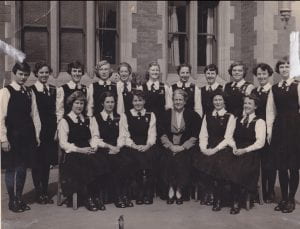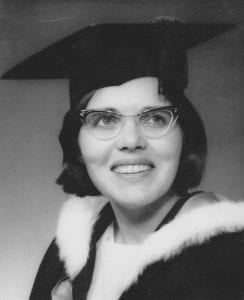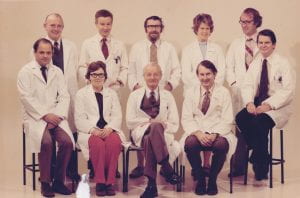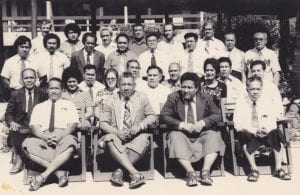This biography was written by Steve Faoagali—the third of Dr Joan Faoagali’s seven children. The recollections shared below are his own and not necessarily representative of my siblings or others that knew Joan. Some background information has been included from Joan’s self-penned obituary.

Joan Faoagali (nee Wilson): back row, third from the right
My mother, Joan Lorraine Wilson, was born on 3 September 1940 in Ashburton, New Zealand. She was the eldest child of Alice and Les Wilson. Joan has one younger sister and two younger brothers. She spent her formative years in Dunedin living in North East Valley, Opoho and Lookout Point. Mum was educated at North East Valley School which her mother also attended, then Otago Girls High School.
Mum grew up in humble surrounds as the daughter of an office clerk (father) and secretary (mother). Following high school she initially trained as a radiographer at Dunedin Hospital before being accepted into Otago University to study medicine in 1960. Mum paid for her medical course by working as a radiographer after hours and by the time she graduated MBChB in 1966, she was married to Malaki Faoagali and her first born child Susan was one year old.
Over the next five years, four more children were added to the family (Kathryn, me, Anna, and Mepi). In 1974 we moved from Dunedin to Christchurch where mum had been appointed the Director of Microbiology at Christchurch Hospital.
In 1977 dad was diagnosed with cancer and as he wished to return to Samoa, mum took leave from work and the family relocated to Samoa until after dad died in September 1978. The family then moved back to Christchurch and mum resumed her position at the hospital. Mum later met and married Pathologist Dr James Francis Gwynne and had two more children, James and Elizabeth.
In 1985 the family relocated to Brisbane following Joan’s appointment as Director of Microbiology at the Royal Brisbane Hospital. Mum remained with Queensland Health for the rest of her full-time career before retiring at 72. Mum continued to work part-time via consultancies, various boards, and teaching, right up until she was bedridden with secondary breast cancer in late 2016.
All of mum’s siblings were university educated in their chosen fields including a nurse (sister), PhD (brother), and Gastroenterologist (brother). Mum’s chosen career had a profound impact on me and my siblings, as in it inspired us all to choose much less demanding careers.

The closest that any of us got to ‘Doctor’ was my oldest sister Susan who achieved a PhD (Education). Just before mum died, she was so excited to learn that my youngest sister Elizabeth had been accepted into university to commence a course in nursing in 2017. As a public health zealot, mum had a long history of supporting nursing education, with a deep-seated respect and acknowledgement of the importance of nurses in the public health system.
Growing up with a medical doctor as a parent was just our version of normal. We knew no different. I didn’t really reflect on the impact of this until I became an adult, and then again when I started to have my own children.
Having a microbiologist as a parent meant many things. Mum used to get excited whenever we got an infection. We were a potential source of slide picture opportunities for that next presentation. In later years the grandchildren would experience this unorthodox enthusiasm for illness too, and in the digital age, mum’s stock material grew exponentially.
I could never fake sickness to get a day off school. In fact, being sick was not enough of a reason to be away from school anyway. I used to complain about this to my friends that had actual caring mothers. Mum was such a strong advocate for building your own immune system’s capability that I would at times misinterpret this for a mum that was so evil that she actually wished me to be sick.

Back row (left to right): Pat Kelleher, Mike Beard, Laurie Treadgold, Helen Angus, Robin Fraser
Front row (left to right): Claude Andre, Joan Faoagali (nee Wilson), [Unknown], Roy McGiver, Jack Hamer
Armed with all the knowledge that one would need and all the broad-ranging wisdom of the world—by my early teens—I would put forward a well-formed indisputable case to mum, something along the lines of “but everyone else’s mum gets them medicine when they are sick, why do you hate me so much?” This of course prompted a full-blown lecture (that was actually evidence-informed) on the dangers of over-prescribed antibiotics and a whole bunch of other stuff that I really didn’t understand. And depending on my timing, it might also include a scathing attack on those other mothers that despite their naivety were borderline child abusers.
As naïve parents of our own first child, it was sometime around 1999 when mum visited and saw that my wife Karen had applied mercurochrome to a couple of scrapes on our daughter’s arms. I can still hear mum’s outburst nearly 20 years later “Why are you using this? Where did you get it from? Don’t you know you are poisoning her?” It was just the kind of confidence buster that as new parents we really didn’t want. However, we later regrouped and found a way to continue to benefit from and appreciate mum’s ever-growing medical knowledge and expertise.
Mum of course had flaws, and like most children we can all think of things that are wrong with our parents, simply because they are our parent. Mum wasn’t going to be nominated for any child protection awards when she ‘accidentally’ left me stranded for a couple of hours at the age of five following a family outing to Ferrymead on the outskirts of Christchurch, or when she did the same thing two years later, however this time in a remote part of Samoa.
One of my earliest memories about mum being a doctor was in the early 1970s when I was about 5 years old. Mum hosted a social event at home for her work colleagues and introduced us to the guests as they arrived. I remember being totally amazed at the other doctors and said to mum “I didn’t know that boys could be doctors too!” I wasn’t immune to gender stereotyping. I just didn’t realise it at the time that my view of women being independent and assertive breadwinners was in such contrast to the dominant view of that time.
The impact of growing up with a doctor as a parent on each of my siblings is no doubt a unique experience as seen through their own lenses, which is to be expected when there are seven of us born across three decades. As the only non-biological child (adopted as a baby in the late 1960s) I perhaps had another layer of perspective, which from my experience was all positive due to mum’s unconditional acceptance of me and raising me as a regular part of the family.
I am sure that my siblings could recall difficult moments growing up with a mum who was often busy and pre-occupied with work. Our family equilibrium was upset and reset through mum’s second marriage to Pathologist Dr James Francis Gwynne. Not only did we have two more siblings, we now had two doctors in the home.
There were many family meals had amidst all sorts of doctor-to-doctor discussions including myth busting sensationalist newspaper reports depicting the latest infection threatening to kill us all, a review of slides to include in an upcoming presentation about autopsies or how to effectively treat boils, as well as full-blown arguments about what illness was plaguing one of us kids at the time. In our home you either grew up with a strong stomach and a quirky sense of humour, or you ate alone.
Mum (and no doubt her siblings) would probably agree—stereotypical of the eldest child—she wanted to be in charge. What better way to hone your leadership skills than to create your own organisation of seven staff (aka children) with the aid of two consecutive 2ICs (aka husbands)?
I recall many a time being part of a well-oiled machine that was tasked with getting the house ready for some kind of social event and then heeding our CEOs coded instruction to “FHB” (Family Hold Back) when the food was laid out. FHB was really important—at least it was to our CEO—in order for her to achieve her two main key performance indicators. Firstly, to ensure that the visitors actually got to eat and secondly, that every visitor formed a view that it really was no trouble for the CEO to pull off such an amazing event. We knew it was an extra special event when mum added “SNH” (Seen and Not Heard) to the routine.
While mum sometimes worked long hours, worked every other Saturday, and was regularly on call, I am thankful that we grew up during a time where personal computers were not yet mainstream and where smartphones were still science fiction.

Joan Faoagali (nee Wilson): second row, third from the left
Samoa and fa’a Samoa (the Samoan way) was a very big feature of mum’s life and sense of purpose. From marrying a very ‘fresh’ Samoan man back in the 60s when it really wasn’t cool to do so; adopting and raising another Samoan child as if he was her own; relocating her then family of five children back to Samoa in the 70s to support her husband’s wish to see his life out in his homeland; working at the National Hospital in Samoa; witnessing her two eldest daughters Susan and Kathryn being bestowed with Matai titles (Samoan chief titles); to having a lifelong connection to Malaki’s extended family (and recipient of their unconditional acceptance of her being a part of their aiga) for the remainder of her life.
Following her retirement from Queensland Health a few years ago, mum was the front runner at the penultimate stage of a recruitment process, to become CEO of the Department of Health in Samoa. As it turned out, Cabinet was not quite ready for mum’s progressive plans and instead offered the job to the next preferred candidate. She rationalised that if there was a mismatch between what she and they believed was needed, then she really wasn’t the right person for the job. It didn’t dampen her spirits, as she continued to do consultancy work in the Pacific region, a reflection of her passion and lifelong commitment to the health of people in that region in particular.
I recently found an old newspaper article from the 1970s featuring mum in one of her first leadership positions in the public health system. In the article she was reflecting on her journey from medical school to work, saying that from her point of view, graduating was just the beginning.
She certainly lived by this belief. Despite many challenges mum never stopped studying and looking for ways to grow. She was very clear about why she did this. For mum it was always about the patients and those that could benefit from her skills, knowledge and commitment to continuous improvement that drove her.
If anything, it was her passion for doing something that she absolutely loved that rubbed off. We were encouraged to do the things that made us tick, to have the confidence to give anything a go, and to learn and grow from our experiences.
A lasting pearl of wisdom that mum gave to me was to not put off the things I really wanted to do. I asked mum in her final weeks if there was anything left that she wanted to do, anything still on her bucket list. She thought for a moment then said “no, I have done everything I wanted to do.”
Mum died peacefully at home, surrounded by her family, on 1 January 2017. She is survived by two brothers, a sister, seven children, ten grandchildren, and two great-grandchildren.
